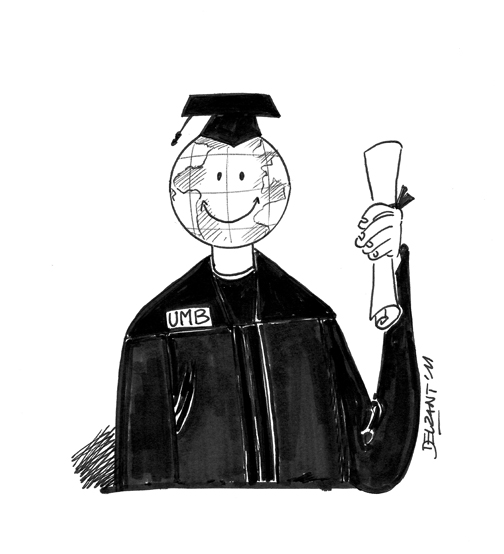“The world is a book, and those who do not travel read only a page!” St. Augustine
Take a leap, take a trip – study abroad. A semester spent abroad can be one of the most rewarding experiences a person can have not only during their college years, but in their entire lifetime. So with the abundance of incredible opportunities that await UMB students, consider the possibility.
Why study abroad? It’s not just about learning a second language, it’s about experiencing another culture. It’s an opportunity to learn in an international classroom with students from every corner of the globe. My own study abroad has resulted in continued friendships with fellow students from Asia, Africa, and Europe. This long-lasting benefit has only enhanced an already great experience. And although taking yourself out of your comfort zone is a temporary challenge, studying abroad will affect you permanently, in the most positive way.
Every year, eighty of our fortunate fellow students seize this opportunity and participate in a semester-long study abroad at one of UMB’s reciprocal universities. Through this reciprocal program, students can study abroad at the same cost as their normal UMB tuition and fees. The semester abroad has programs in Australia, Germany, Ireland, Italy (there are two – one in Italian and one in English), France, China, Japan, Korea, Scotland, three destinations in the West Indies, and two in Canada. Federal Financial Aid and Pell Grants can be taken with you, plus they fit nicely in a suitcase.
With a department dedicated to both inbound and outbound students, the Office of International and Transnational Affairs (OITA) holds two informational Study Abroad Fairs each year, offering a chance to meet with study abroad providers and partners, according to Lurlene Van Buren, Coordinator of Study Abroad & International Exchange Programs.
UMB students have chosen Australia as their number one destination – see, studying abroad really isn’t exclusively about learning a foreign language. Spain, Germany, and the Oxford Program in England are popular as well. These are all full-curriculum universities. And while I’m not sure of the long-lasting effect Snookie, Pauly D, and the Situation will have on the popularity of studying abroad in Florence, nationally Italy continually ranks high along with Spain, France, Great Britain and China.
Students of sophomore standing and above are eligible to study abroad. And while the number of students who choose to stay abroad for a full-academic year is low, an increasing number are doing so in the abbreviated summer semester.
Historically, the student body at UMB has been non traditional – a student population comprised of many first generation college attendees, those paying their own way, and most with jobs or their own apartments. As a commuting campus, a semester abroad could result in the loss of a well-needed job or apartment. There are some obstacles a non-traditional student has to overcome before they can embark on a study abroad program. Joe, a current (and non-traditional) student who studied abroad in Italy in 2008, addressed some of these concerns.
“Living on my own meant that I needed to find a sublet for my apartment, and it also meant that I needed to officially leave my job, because I couldn’t take a leave of absence for more than three weeks,” Joe shares. “So I had to quit officially, but they were more than willing to re-hire me when I returned.”
“The advice I would give would be to make sure that you save as much as possible before hand,” he adds.
While this is great advice for our non-traditional students to heed, as the demographics of our student body changes and becomes more traditional, so too will the face of UMB student studying abroad. But for all of our students – both traditional and non – those choosing to spend a semester abroad know that they are also investing in their future.
“A study abroad program not only increases their knowledge of the world and of other countries and their cultures, and broadens their own perspective and personal development,” Lurlene Van Buren says, “but it also increases the global skills needed to remain competitive in this increasingly global job market.”
Why study abroad? Why not!





















































